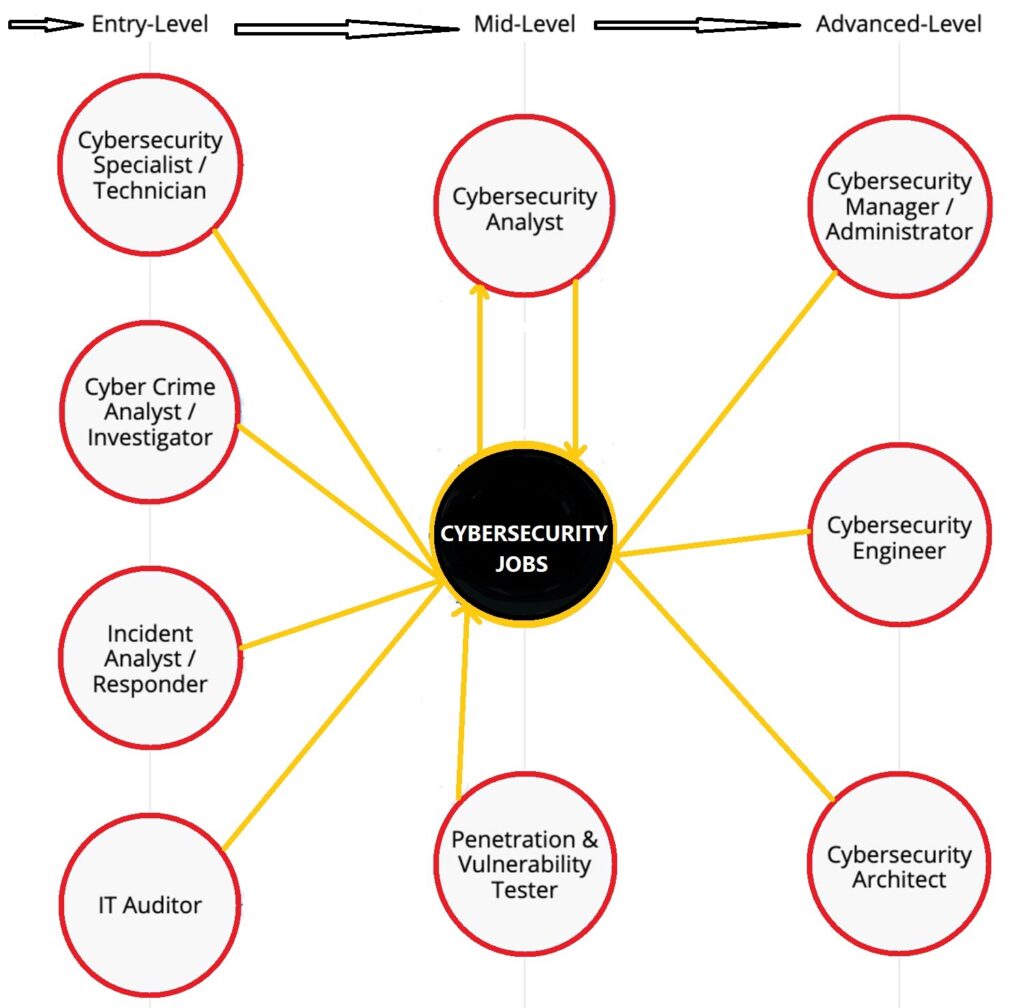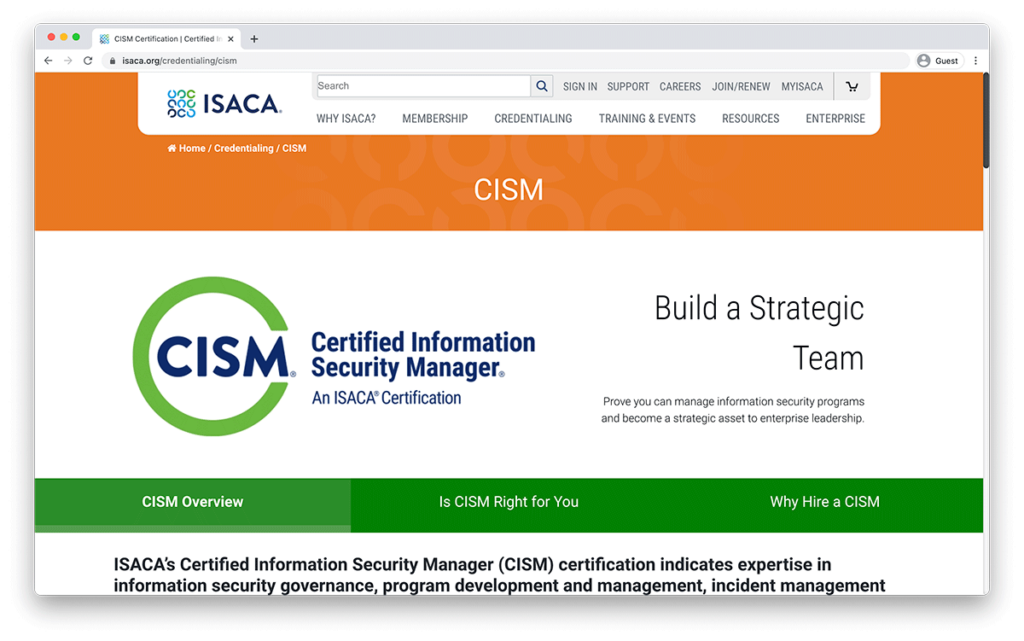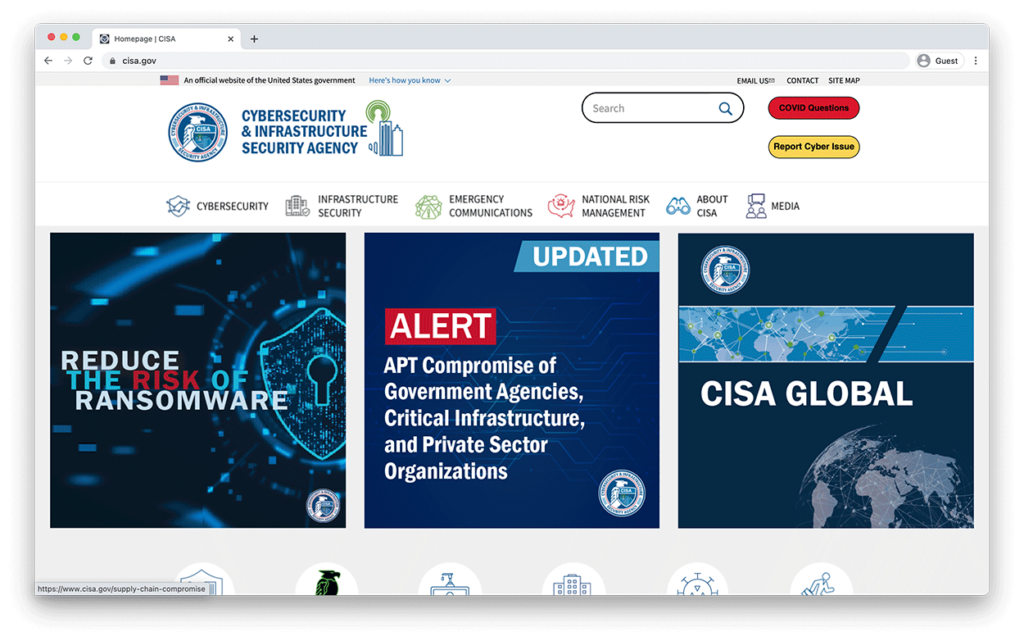Getting into the cybersecurity industry is possible even without a cyber degree or background. This comprehensive guide provides you with all the information you need to enter the field of cybersecurity.
In addition to data analytics, programming, and DevOps, cybersecurity stands out as one of the most sought-after skill sets in today’s job market. If you’re intrigued by the field and eager to make your mark, you’re probably wondering how to get started, what the job entails, and what skills you need to thrive in cybersecurity, both technically and in terms of soft skills.
Our article is here to answer all those burning questions. Whether you’re an experienced cybersecurity engineer, a recent college graduate, or a complete newbie, you’ll find valuable insights and guidance to pave your way into the exciting world of cybersecurity.
So, let’s dive in and discover How to Get Into Cybersecurity.
Key Points Covered in The Article
- The field of cybersecurity is growing rapidly and is currently experiencing a significant skills gap.
- Jobs in cybersecurity are in high demand and offer attractive salaries.
- Starting with a Security+ certification is recommended, followed by choosing a secondary certification based on your career goals.
- Many technical fields have skills that can easily be transferred to the field of cybersecurity.
- Soft skills, such as presentation and communication abilities, are also important in a cybersecurity career.
- There are numerous career paths to pursue in cybersecurity, depending on your interests and skill set.
- Proficiency in programming languages like Golang and JavaScript is essential for technical roles in cybersecurity.
- Pursuing a career in cybersecurity can be achieved through various paths, including cybersecurity boot camps, college programs, or self-teaching, as all three options can help you acquire the necessary certifications.
What Does Cyber Security Mean?

Cybersecurity is all about safeguarding networks, resources, and systems from digital threats and cyber attacks. In simple terms, it’s the practice of protecting our digital world from malicious activities.
But don’t be fooled by its apparent simplicity. Cybersecurity is a multifaceted field that encompasses various disciplines and best practices to ensure the safety, integrity, and reliability of our networks and digital systems.
What is The Importance of Cyber Security?
Well, in today’s interconnected world, we live a significant portion of our lives online.
Whether it’s social media, online shopping, gaming, or remote work, our digital activities involve valuable data such as passwords, credit card information, personal identities, and sensitive documents.
The repercussions of a data breach can be severe, ranging from personal embarrassment and reputational damage to substantial financial costs.
However, cyber-attacks aren’t solely focused on stealing information. They can also target infrastructure controls and compromise the integrity of our data.
As hackers continuously develop new and innovative techniques, organizations face increasing financial burdens to protect their valuable assets.
In fact, alarming statistics reveal that a cyber attack occurs every 14 seconds, with projected costs soaring up to trillions of dollars.
Considering these risks, it becomes imperative for both individuals and organizations to prioritize cybersecurity.
We must find effective ways to secure our data to safeguard our personal lives and protect the interests of businesses and institutions.
By investing in robust cybersecurity measures, we can mitigate the potential harm caused by cyber-attacks and ensure the safety of our digital world.
Let’s Dive into the World of Cybersecurity Jobs
If you have conducted any research on cyber security positions, you may have come across the term “cybersecurity talent gap.”
This gap refers to the shortage of skilled cyber security professionals available to fill the growing number of positions in organizations.
According to recent estimates, there will be a global shortfall of over 3.5 million cyber security roles in 2021. This presents an opportunity for individuals who are interested in training for these positions.
Additionally, a report by PricewaterhouseCoopers indicates that less than half of companies worldwide are adequately prepared for cyberattacks.
As cyberattacks become more frequent and severe, there is a pressing need for skilled personnel in the cyber security industry. So, what does it take to enter the field of cyber security?
In order to pursue a career in cyber security, there are certain prerequisites and skills that you should acquire.
Now let’s talk about what you need to get into cyber security.
Education for Getting into Cybersecurity Jobs
Cybersecurity encompasses a broad range of job roles, offering opportunities for individuals from diverse backgrounds to contribute to the field. Educational requirements in cybersecurity can vary, depending on the position.
A bachelor’s degree in cybersecurity or a related field may not be a strict requirement for entry-level cybersecurity jobs. Employers often prioritize relevant skills and certifications over specific educational qualifications.
On the other hand, more advanced positions typically require at least a bachelor’s degree and, in some cases, a master’s degree.
For example, the role of a Chief Information Security Officer (CISO), a mid-executive level position responsible for overseeing an organization’s cybersecurity strategy, usually necessitates a bachelor’s degree in cybersecurity or a similar field, along with 7-12 years of relevant experience.
Some larger companies may even require a master’s degree in cybersecurity or a related field for such roles.
It’s worth noting that while a formal education is valuable, obtaining certifications is highly beneficial for a successful cybersecurity career.
Certifications provide tangible proof of your expertise and demonstrate your competence in specific areas of cybersecurity, making you a more competitive candidate in the job market.
In conclusion, while the educational requirements for cybersecurity positions can vary, acquiring relevant certifications and continuously updating your skills are key factors for excelling in the field.
Salaries in Cybersecurity and Cyber Security Job Market
A cyber security career offers a well-paying position, thanks to the high demand for such jobs and the specific skills required, which make the employment package quite appealing.
However, it is important to note that average salaries for cyber security roles can vary from state to state, similar to most professions.
To give you an idea of how salaries can differ based on location, here are the average salaries for states with a high demand for cyber security professionals. Let’s start with cyber security salaries in New York:
According to Indeed.com, entry-level salaries in cyber security vary depending on the specific position. Here are the prevailing cyber security roles in New York and their corresponding salaries:
- Security Officer: $55k
- Security Engineer: $140k
- Security Administrator: $93k
- IT Security Specialist: $118k
- Information Security Analyst: $101k
- Entry-level Analyst: $64k
Moving on to Washington, D.C., where the following positions are highly sought after, along with their corresponding salaries:
- IT Security Specialist: $120k
- Information Security Analyst: $120k
- Security Engineer: $136k
- Security Analyst: $120k
- Intelligence Analyst: $106k
San Francisco is another thriving market for cyber security, with numerous global companies having corporate offices there. Here are the most sought-after positions and their salaries:
- IT Security Specialist: $138k
- Information Security Analyst: $92k
- Security Engineer: $159k
- Security Analyst: $156k
Seattle also offers abundant cyber security opportunities, with employers looking to fill various roles. Here are the most sought-after positions:
- IT Security Specialist: $118k
- Information Security Analyst: $110k
- Security Engineer: $138k
- Security Analyst: $123k
Similarly, Chicago hosts numerous cyber security opportunities, with the following positions being in high demand:
- IT Security Specialist: $107k
- Information Security Analyst: $89k
- Security Engineer: $127k
- Security Analyst: $81k
Lastly, let’s consider the national averages for the most sought-after cyber security jobs:
- IT Security Specialist: $82k
- Information Security Analyst: $94k
- Security Engineer: $108k
- Security Analyst: $99k
How to Get into Cybersecurity from Another Technical Field
Transferring skills from other technical fields to the realm of cyber security can be highly beneficial. However, certain skills like security operations and information systems might need to be acquired or enhanced.
To quickly gain the necessary skills for a new career in cyber security, enrolling in a cybersecurity bootcamp is an excellent option.
Various technical roles can serve as a solid entry point into the field of cyber security. Professionals working in financial and risk analysis, security intelligence, and similar positions are well-suited for transitioning into cyber security.
Interestingly, only about 20% of employers consider an undergraduate degree in cyber security or a related field as the most crucial qualification for job applicants.
Instead, skills and professional certifications are often valued more than a degree. Proficiency in fundamental and advanced cyber security concepts, along with strong non-technical or soft skills, is highly sought after.
Lensa is a US job board that uses AI and machine learning to instantly connect cybersecurity talent with the best opportunities. Furthermore, as a career advocacy platform, Lensa helps millions of job seekers make smarter career choices. Job seekers at Lensa have all kinds of opportunities in cybersecurity at their fingertips such as remote, full-time, part-time, hybrid, and more.
Overall, Lensa provides cybersecurity professionals hunting for opportunities with a comprehensive image of their job search, as well as forecasts on their career pathways to realize their full potential in the most appropriate position. All of this is possible because of powerful AI-based job matching, clean and rapid job searches, tailored job alerts, and job seeker assistance.
Technical Skills Needed to Get into Cybersecurity from Another Technical Field
Risk assessment and management: Identifying potential threats, analyzing risks, and evaluating appropriate measures to protect an organization. Evaluating system vulnerabilities and assigning vulnerability scores are also important tasks.
Authentication: Verifying user identity to grant access to digital resources. Developing new authentication schemes and auditing existing ones for potential data leaks or breaches. Familiarity with firewalls and Intrusion Detection Systems (IDS) is also valuable.
Linux: A flexible and transparent open-source operating system widely favored by cyber security professionals. Many cyber security tools are specifically designed for Linux, such as penetration testing, vulnerability analysis, and ethical hacking.
Information systems: Understanding how data is collected, processed, stored, and distributed within and outside an organization. Proficiency in tracing data routes and identifying potential breaches, leading to the development of robust protective measures.
Digital forensics: Knowledge of investigative methods used to detect anomalies and malicious activities within a network. This skill is essential for identifying and mitigating cyber security incidents.
Coding languages: Fluency or familiarity with various coding languages commonly used in cyber security roles.
Soft Skills for Getting into Cybersecurity
In addition to technical expertise, the following soft skills are crucial for success in the cyber security field:
- Communication skills
- Analytical thinking
- Problem-solving ability
- Adaptability
- Collaboration skills
Developing these soft skills alongside technical proficiency will greatly enhance your effectiveness as a cyber security professional.
Teamwork
When it comes to cyber security, it’s not just about one person working alone. In fact, most organizations have a team of experts who work together to protect their systems and data.
The size of the team depends on how big the organization is and how much data they have to protect. It’s essential for the team members to get along and work well together.
If there’s any conflict or disagreement, it can make the team’s performance suffer, and that can be risky for the organization.
Presentation skills
Cyber security experts often have to explain really technical stuff to people who may not have much technical knowledge. It’s like trying to explain a complex video game to someone who has never played one before.
So, it’s important for these experts to be able to break down complicated ideas into simpler ones and explain them in a clear and easy-to-understand way. Sometimes, they even use pictures or diagrams to help explain things better.
Problem-solving skills
Being good at solving problems is important in many areas of life, especially in cyber security. Cyber security professionals must be like detectives who can spot potential problems before they happen and find ways to prevent them.
It’s like stopping a thief before they can break into a house rather than waiting for them to break in and then trying to catch them.
So, it’s really important for these experts to be able to think ahead and come up with smart solutions to keep systems and data safe.
How to Get Soft Skills to Get Into Cybersecurity and Show Your Experience
If you’re into technical stuff and want to become a cyber security expert, there’s a cool option for you called a cyber security bootcamp. It’s like a special training program where you can quickly learn all the skills you need for a cyber security career.
These bootcamps are designed to be fast and not too expensive, and they offer different options for how you want to learn, like going full-time or part-time and attending classes in person or online.
When it comes to showing off your skills, it’s all about networking. One really fun way to do this is by going to hackathons. They’re like big events where people work together to solve cyber security problems.
It’s like a marathon where you have to find solutions in a short amount of time, usually a few days. Hackathons are a great chance to prove your skills in a competitive environment.
You can also try going to local security meetups and events, where you’ll meet other people who are into cyber security. It’s a cool way to make friends and learn cool things from insiders in the field.
Getting into Cybersecurity With a Background in IT.
If you’re into the IT sector, you’ll be happy to know that a lot of the skills you already have can be super useful in the world of cyber security.
For example, if you’ve done software engineering, you probably know how to work with databases and use different frameworks to build websites and apps.
And if you’ve dabbled in IT, you might be familiar with things like information systems and computer networks.
You might have even learned how to set up and manage computer systems, do some coding, handle databases, follow IT rules, and understand how businesses work in the real world.
All of these skills can come in handy if you want to pursue a career in cyber security.

Technical Skills Needed for Getting into Cybersecurity with an Experience in IT Sector.
Depending on the specific cyber security role you’re interested in, the technical skills you’ve gained from your previous IT experience might not directly match.
But don’t worry; there are certain IT roles that can be a great starting point for a career in cyber security. They’re like stepping stones that help you build a strong foundation. Here are some of the technical skills you might need:
Risk assessment and management: This skill involves identifying and evaluating potential risks to computer systems and coming up with strategies to deal with them.
Cryptography: It’s all about protecting information by turning it into secret codes that only authorized people can understand.
Security operations: This means keeping a close eye on computer systems, detecting any suspicious activity, and taking action to keep them safe.
Information assurance: It’s about making sure that information is secure, available when needed, and trusted to be accurate.
What Soft Skills to Consider to Get into Cybersecurity if You’re Already in IT
Verbal and written communication: Being able to explain ideas clearly, both when talking and when writing, is really important in cyber security.
Presentation skills: It’s about being able to present technical information in a way that’s easy to understand for people who might not be so tech-savvy.
By developing these skills, you’ll be well-prepared to start a career in cyber security. Even if your background is in IT, these skills will help you navigate the exciting world of cyber security and keep computer systems safe from potential threats.
How to Get These Skills and Show Your Experience to Get into Cybersecurity?
If you’re interested in the IT field, you’ll be happy to know that it can be a great starting point for a career in cyber security. One important step you can take is to earn certifications that show your expertise in the field.
While getting certified may seem like a big investment of time and money, there are other options to consider, like attending bootcamps.
Bootcamps are programs that offer flexible learning opportunities at a more affordable cost, helping you improve your skills and compete in the world of cyber security.
It’s important to understand that certifications are highly valued by employers in the cyber security industry.
They serve as official proof that you have the necessary skills and knowledge, and they come from trusted organizations. Having certifications can give you an edge when applying for jobs and show that you have valuable skills to offer.
So, if you’re interested in cyber security, consider starting with an IT background and then focusing on earning certifications to showcase your expertise. It’s a great way to build a solid foundation and open doors to exciting opportunities in the cyber security field.
How to Get into Cybersecurity with No Technical Experience
We’ve talked a lot about how people with technical backgrounds can do really well in cyber security. But guess what? You don’t have to be a tech wizard to make it in this field! Cyber security has something for everyone, whether you’re a techie or not.
Sure, if you’re not from a technical background, it might take you a bit longer to get started in cyber security. You’ll need to learn some new skills that those with tech experience already have.
But don’t worry; we’re here to help! We’ve put together a list of skills that you can focus on when you’re just starting out.
The great thing about cyber security is that it’s a diverse field, and it values people with different backgrounds and interests.
So even if you’re not a computer genius, you can still have a fantastic future in cyber security. Just keep learning, stay curious, and work hard, and you’ll find your place in this exciting field!
Technical Skills Needed for Getting into Cyber Security With No Technical Experience
If you’re getting into cyber security without a technical background, it means that you might not have as much experience with the technical skills needed for the job. But don’t worry; there are some important skills you can learn to catch up and thrive in the field:
Penetration testing: This is like being a detective who tries to find weaknesses in a computer system by pretending to be a hacker. It’s a way to test how strong a system’s security is and make it better.
Cloud security: The cloud is like a big storage space where you can keep your files and access them from anywhere. Cloud security is all about making sure that your files and information are safe when stored in the cloud.
Digital forensics: This is like being a digital detective who investigates cyber crimes. When there’s a problem or a cyber attack, digital forensics experts use special tools to find out what happened, who did it, and how they did it.
By focusing on these skills, you can become a valuable member of the cyber security team and help protect computers, networks, and information from bad guys. It’s an exciting field that needs people like you to keep things safe in the digital world!
Soft Skills Needed to Get into Cybersecurity With no Technical Experience
If you come from a non-technical or IT background and are interested in pursuing a career in cyber security, there are certain skills that will be important for you to develop.
While some skills may be similar to those needed by people with technical expertise, a couple of key skills are especially important for someone like you.
Willingness to learn:
Starting from a non-technical background means that you might encounter many new things that you haven’t learned before. This can sometimes put you at a slight disadvantage compared to those with IT experience.
However, having a strong desire to learn and a willingness to put in the effort to gain new knowledge will help you catch up quickly.
In fact, it’s one of the most important skills you can have! Embrace the opportunity to learn and grow, and you’ll be able to acquire the necessary skills in no time.
Management skills:
While cyber security is heavily focused on technology, it’s also important to remember that it involves working with people. Developing good communication and interpersonal skills will help you work effectively with others in the field.
Additionally, having good time management skills will enable you to stay organized, meet deadlines, and handle multiple tasks efficiently.
By focusing on these skills and having a positive attitude towards learning, you can overcome any challenges that may come your way and excel in the field of cyber security. Remember, even though you may not have a technical background, there is no limit to what you can achieve with the right mindset and determination!
How to Get These Skills and Show Your Experience?
If you’re interested in cyber security but don’t have much experience in IT, don’t worry! You can still pursue a career in this exciting field. However, it’s important to understand that you may need to put in extra effort to catch up with those who have an IT background.
One option is to consider going to college and getting a degree in cyber security. This will help you learn the theory behind cyber security and give you a solid foundation in the concepts and principles.
While college can be expensive and time-consuming, it can provide you with a comprehensive education in the field.
If college isn’t the right path for you, there’s another option called a bootcamp. Bootcamps are intensive training programs that focus on practical skills and hands-on experience.
They are shorter and more affordable than college programs but may not cover as much theory. Bootcamps can be a great way to quickly acquire the skills needed for entry-level cyber security jobs.
Another approach is to combine a bootcamp with self-study. This means attending a bootcamp for practical training and then supplementing it with your own independent learning.
Self-study can involve reading books, watching online tutorials, and practicing on your own. This combination allows you to gain both practical skills and a deeper understanding of the underlying theory.
No matter which path you choose, remember that continuous learning is essential in cyber security. The field is always evolving, and there’s always something new to learn.
By staying curious, dedicated, and open to learning, you can pave your way to a successful career in cyber security.
How to Choose a Cybersecurity Career Path – With Cyber Security Salaries
When it comes to cyber security, there are different jobs you can consider based on what you’re good at and what you find interesting. Let’s take a look at some of these roles:
Penetration Tester
Imagine being hired to hack into computer systems, but for a good reason! Penetration testers help find weaknesses in systems by simulating cyber attacks. They are like puzzle solvers who enjoy figuring out how to protect systems from bad guys.
Average Salary: $118k
Compliance Analyst
These folks make sure that organizations follow the rules set by the government and industry. They do research and administrative work to ensure that organizations are up to date with the regulations. They are like rule enforcers who help keep things in order.
Average Salary: $92k
Threat Intelligence Analyst
These analysts keep an eye out for potential cyber threats to organizations. They pay close attention to details, stay organized, and are good at explaining things to others. They are like detectives who detect and prevent cyber crimes.
Average Salary: $98k

SOC Analyst
SOC analysts work in a Security Operations Center and monitor computer networks for any signs of trouble.
They need to understand how computer systems work and use special tools to protect networks from hackers. They are like security guards who keep a close watch on the computer systems.
Average Salary: $106k
Cyber Security Engineer
These engineers are technical experts who know a lot about computers and networks. They set up security measures like firewalls and help manage projects and teams. They are like problem solvers who make sure everything runs smoothly.
Average Salary: $108k
Cyber Security Consultant
Consultants provide advice to organizations on how to improve their security. They use their knowledge and skills to assess risks and suggest ways to make things safer. They are like trusted advisors who help organizations stay secure.
Average Salary: $89k
Remember, these are just a few examples of the jobs you can have in cyber security. It’s important to find something you enjoy and are passionate about. Keep learning and exploring, and you’ll find the right path for you in the exciting world of cyber security!
Cybersecurity Certifications
Getting certified in cyber security is a great way to show that you have the skills to protect computer systems and information from hackers. There are different certifications you can choose from, but let’s talk about three popular ones:
CompTIA Security+
This certification is a good starting point for beginners. It covers the basics of cyber security and shows that you understand how to keep computer systems safe. It’s like a foundation that can help you build your skills.
CISSP (Certified Information Systems Security Professional)

This is an advanced certification that’s considered very prestigious. It’s like the black belt of cyber security! It shows that you’re an expert in many areas of cyber security and have at least 5 years of experience. It’s a great goal to aim for once you have more knowledge and experience.
CISM (Certified Information Security Manager)

This certification is for people who want to be in charge of managing security systems for big companies. It shows that you know how to design and implement strong security measures to protect important information. To get this certification, you usually need 5 years of experience.
Remember, these certifications are not the only options out there.
There are many more, depending on your interests and career goals. Getting certified in cyber security can help you stand out to employers and open up exciting opportunities in the future.
Just keep learning, practicing, and exploring different areas of cyber security, and you’ll be on your way to becoming a cyber security expert!
Key skill That You’ll Need for Cyber Security Jobs
When it comes to cyber security, programming languages play a significant role in helping professionals tackle various challenges. Let’s take a look at some of the most important programming languages used in the field and why they’re important.
Languages That You’ll Need to Get into Cybersecurity
Python: Python is a popular and easy-to-learn programming language. It is widely used in cyber security because of its simplicity and readability. With Python, you can analyze data, build tools, and automate tasks. Its extensive libraries and strong community support make it a valuable language to know.
Golang: Golang, also known as Go, is a programming language commonly used for creating malware. While this may sound strange, understanding Golang helps cyber security professionals detect and counteract malicious programs. Its portability and ability to avoid antivirus detection make it important to study.
JavaScript: JavaScript is the language used to make websites interactive. It enables you to add functionality to web pages, validate forms, and perform various tasks on the client side. Understanding JavaScript is crucial for identifying and preventing web-based attacks.
C: C is a foundational programming language that is widely used in cyber security. It allows professionals to develop tools, analyze and understand malware, and identify vulnerabilities in computer systems. Learning C helps you gain a deeper understanding of how computers work.
C++: C++ is an extension of the C language and is known for its power and flexibility. It is used to build complex applications, including antivirus software and network security tools. Learning C++ opens up opportunities for working on advanced cyber security projects.
SQL: SQL (Structured Query Language) is used to manage and manipulate databases. It is important in cyber security because databases often store valuable information that needs to be protected. By learning SQL, you can understand how to secure databases and prevent unauthorized access.
Assembly: Assembly language is a low-level programming language that communicates directly with computer hardware. It is used for tasks such as reverse-engineering malware and understanding computer vulnerabilities at a deep level. Mastery of assembly language is highly valuable for cyber security professionals.
Powershell: Powershell is a command-line scripting language primarily used in Windows environments. It allows system administrators to automate tasks, manage security settings, and investigate system events. Understanding Powershell helps professionals analyze and respond to security incidents effectively.
Ruby: Ruby is a flexible and user-friendly scripting language. It is often used for web development and can help in creating secure web applications. Its clean syntax and ease of use make it a popular choice for both beginners and experienced developers.
Java: Java is a versatile programming language used for building a wide range of applications, including security tools and network scanners. It offers powerful features and is widely adopted in the cyber security industry.
PHP: In terms of cyber security, PHP plays a crucial role in securing web applications and websites.
Professionals proficient in PHP can implement security measures, handle user input securely, prevent common web vulnerabilities such as SQL injection and cross-site scripting (XSS), and ensure the overall security and integrity of web-based systems.
Considering its significance, PHP should definitely be included in the list of programming languages relevant to cyber security. Its popularity and wide adoption make it an important skill for professionals working in web security and application security.
By familiarizing yourself with these programming languages, you’ll gain valuable skills that can open doors to a career in cyber security. Each language serves a specific purpose and provides unique capabilities to help protect computer systems and networks from threats.
Soft Skills Needed to Get into Cybersecurity
The soft skills required for a successful cyber security role encompass a range of abilities and qualities. Here are the key soft skills to focus on:
- Management Skills:
- Effective time management
- Proficient people management
- Strong project management
- Problem-Solving:
- Analytical thinking
- Ability to assess and resolve complex issues
- Resourcefulness in finding innovative solutions
- Verbal and Written Communication:
- Clear and concise articulation of ideas
- Active listening skills
- Proficient report writing and documentation
- Presentation:
- Confidence in delivering information to diverse audiences
- Effective use of visual aids and presentation tools
- Engaging and persuasive communication style
- Independence:
- Self-motivation and self-discipline
- Ability to work autonomously
- Initiative in seeking and implementing improvements
- Leadership:
- Inspiring and guiding others
- Collaborative and inclusive approach
- Ability to delegate and empower team members
- Logical Reasoning:
- Analyzing complex situations and patterns
- Applying critical thinking skills
- Making sound judgments based on evidence
- Creativity:
- Thinking outside the box
- Generating innovative ideas and approaches
- Adaptability and flexibility in problem-solving
- Willingness to Learn:
- Continuous learning mindset
- Openness to new technologies and trends
- Commitment to professional development
- Loyalty and Integrity:
- Maintaining confidentiality and ethical standards
- Trustworthiness and honesty in handling sensitive information
- Upholding professional ethics and values
To acquire these skills, there are three main paths you can consider:
- Self-Study:
- Utilize various resources such as books, blogs, and trade magazines.
- Take advantage of free or affordable online courses and tutorials.
- Develop discipline and self-motivation to stay focused and committed.
- College Education:
- Pursue a degree in cyber security or a related field.
- Research reputable universities that offer comprehensive programs.
- Be prepared for the time and financial investment required for a 3-4 year degree.
- Cyber Security Bootcamp:
- Explore bootcamp options that offer practical, industry-focused training.
- Consider online or in-person programs based on your preferences.
- Evaluate the curriculum and reviews to ensure the bootcamp aligns with your goals.
Each path has its pros and cons, so it’s important to consider your individual circumstances and learning style. Ultimately, the choice depends on factors such as cost, time availability, preferred learning approach, and career goals.
Recommendations
The Benefits of Cybersecurity Training in the Fight Against Ransomware
How to Protect Your Retail Business From Cyber Attacks
Conclusion
Getting into cybersecurity without prior experience or a degree is absolutely possible. While having experience and a degree can be advantageous, they are not the sole determining factors for success in the field. Cybersecurity is a dynamic and rapidly evolving industry that values skills, knowledge, and dedication.
To embark on a cybersecurity career without experience or a degree, it is essential to focus on building a strong foundation of technical skills and knowledge. This can be achieved through self-study, online courses, certifications, and practical hands-on projects. Engaging in cybersecurity communities, participating in Capture the Flag (CTF) competitions, and contributing to open-source projects can also help you gain practical experience and showcase your abilities.
Networking and establishing connections within the cybersecurity community is crucial. Attend industry events, join online forums and social media groups, and connect with professionals already working in the field. Their guidance, mentorship, and advice can provide valuable insights and opportunities for growth.
Additionally, obtaining relevant certifications such as CompTIA Security+, Certified Ethical Hacker (CEH), or Certified Information Systems Security Professional (CISSP) can help validate your skills and enhance your credibility in the job market.
When applying for cybersecurity positions, emphasize your passion for the field and willingness to learn, and highlight any relevant projects, certifications, or practical experiences you have gained. Tailor your resume and cover letter to showcase your skills, transferable abilities, and dedication to cybersecurity.
While experience and a degree can be advantageous, employers often value practical skills, problem-solving abilities, and a strong work ethic. Demonstrating your passion, continuous learning, and dedication to cybersecurity can help you stand out and secure entry-level positions or internships.
Remember, cybersecurity is a constantly evolving field, and staying updated with the latest trends, technologies, and threats is essential. Continuously improving your skills, pursuing further education, and seeking opportunities for professional growth will help you progress in your cybersecurity career.
With determination, a strong work ethic, and a proactive approach to learning, you can overcome the lack of experience or a degree and successfully break into the exciting world of cybersecurity.




